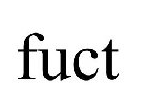“Viewpoint discrimination is poison to a free society. But in many countries with constitutions or legal traditions that claim to protect freedom of speech, serious viewpoint discrimination is now tolerated, and such discrimination has become increasingly prevalent in this country. At a time when free speech is under attack, it is especially important for this Court to remain firm on the principle that the First Amendment does not tolerate viewpoint discrimination. We reaffirm that principle today.”
– Justice Samuel Alito Concurring with the majority opinion in Iancu, Under Secretary of Commerce for Intellectual Property and Director, Patent and Trademark Office v. Brunetti
Defending the Thought We Hate
As I predicted back in January, the United States Supreme Court today invalidated that portion of the Lanham Act 15 U.S. Code §?1052(a) prohibiting registration of trademarks that “[c]onsist[ ] of or comprise[ ] immoral[ ] or scandalous matter.” Back in 2017 the United States Supreme Court invalidated another portion of Section 2(a) of the Lanham Act that prevented federal registration of “disparaging” trademarks. That case dealt with an Asian American musician, Simon Tam, attempting to register the trademark “The Slants” for his band. In invalidating the “disparagement” section of the Lanham Act in Matal v. Tam, 137 S.Ct. 1744 (2017), Justice Alito, writing for the unanimous Supreme Court, quoted Justice Oliver Wendell Holmes, stating “Speech that demeans on the basis of race, ethnicity, gender, religion, age, disability, or any other similar ground is hateful; but the proudest boast of our free speech jurisprudence is that we protect the freedom to express ‘the thought that we hate.’”
Appealing the Case Up the Ladder
The Brunetti case involved Erik Brunetti, and artist and entrepreneur, who sought federal registration of the trademark “FUCT.” Given the Lanham Act’s prohibition on registering immoral and scandalous matter, the examiner at the United States Patent and Trademark Office (USPTO) rejected Brunetti’s application for registration, as did the USPTO’s Trade-mark Trial and Appeal Board (TTAB). Brunetti then appealed his case to the Court of Appeals for the Federal Circuit. The Federal Circuit invalidated the portion of the Lanham Act dealing with immoral and scandalous matter for violating the First Amendment. As the Supreme Court usually does when a lower court has invalidated a federal statute, The Supreme Court granted certiorari (agreed to hear the case on appeal).
The USPTO’s Viewpoint Bias
In upholding the Federal Circuit decision invalidating the immoral and scandalous prohibitions in the Lanham Act, the Supreme Court analyzed not only the Lanham Act, but how the USPTO was applying the Lanham Act in practice. The Court noted that the USPTO had rejected trademark registrations for pro-drug trademarks, while granting registrations for anti-drug trademarks. Similarly, the USPTO had granted trademark registrations for religious terms used for religious purposes, but rejected registrations for religious terms used for secular purposes.

The USPTO Viewpoint Bias Violates the First Amendment
The Supreme Court acknowledged that in the examples cited, the USPTO was rejecting trademarks expressing “opinions that are, at the least, offensive to many Americans.” The Court, however, referred back to its ruling in Tam, noting: “a law disfavoring ‘ideas that offend’ discriminates based on viewpoint, in violation of the First Amendment.” Determining that the immoral and scandalous prohibition in the Lanham Act “aim[s] at the suppression of ” views, the majority had no option other than to invalidate the law.
The Bad News
While it is great news that the Supreme Court has once again invalidated a portion of the Lanham Act in defense of the First Amendment, and defended the right to offend, the partial dissenting opinions are cause for concern. Justices Sotomayor, Breyer, and Roberts all dissented from the majority opinion in that they all believe the offending portions of the Lanham Act should simply be narrowly construed as to apply only to obscene, vulgar, or profane trademarks. While this may seem reasonable on its face, it is unclear how such an interpretation could be implemented without the USPTO examiner’s once again engaging in improper viewpoint discrimination.
In Defense of the Offensive
As a more general matter, I do not know if it is a good idea to have our interpretations of obscenity, vulgarity, and profanity defined by those in the most ivory of towers, completely disconnected from basic cable and the real world watching it. I am going to go out on a limb and opine that what the Justices of the United States Supreme Court might find obscene, may not be obscene to the less priggish South Park viewers in our midst. It is therefore unclear how anyone, let alone academics isolated from hoi polloi, would be able to divide proposed trademarks into a classification like “vulgar.” Such restrictions are nothing more than a defense of ongoing government-mandated viewpoint discrimination. As noted above, “[v]iewpoint discrimination is poison to a free society.”
Brett Trout





Recent Comments